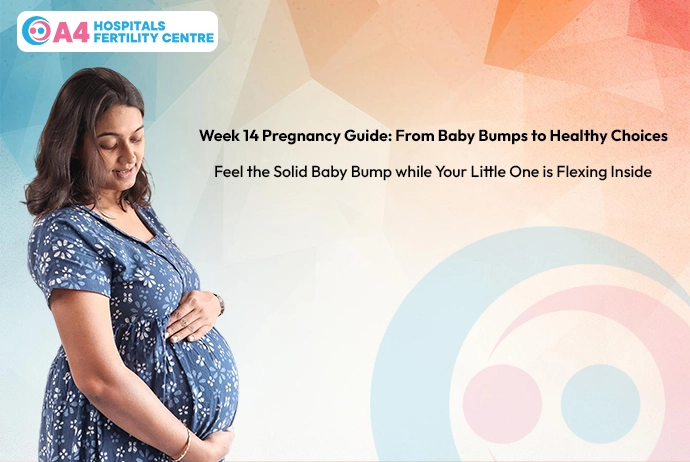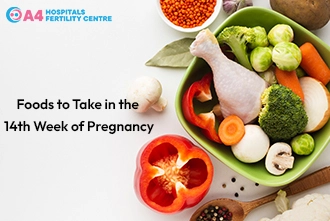
Dr. Aruna Ashok MBBS, MS OG, DNB OG
- Clinical Director

Congratulations on reaching week 14 of your pregnancy! This stage is filled with exciting changes for both you and your baby. Your baby, now about the size of a lemon, is growing rapidly. You may begin to notice a more pronounced baby bump. Your little one is busy stretching and flexing their limbs inside, preparing for future movements you’ll soon feel.
As you touch your growing belly, you might feel a solid, comforting presence. This is your baby’s developing skeletal structure. Their bones are getting stronger, and you’ll soon start feeling their movements, known as quickening. It’s a magical time when your connection with your baby deepens.
Many mothers-to-be find this stage to be a turning point. The initial fatigue and nausea often start to fade, making way for more energy and excitement. It’s also a great time to start talking to your baby. Many research studies show that babies can hear sounds from the outside world at this stage. Your voice is soothing and familiar to them.
Staying active and keeping up a healthy lifestyle is crucial during this period. Gentle exercises, like walking or prenatal yoga, can be beneficial. They help in managing weight, improving mood, and preparing your body for labor. Always consult your healthcare provider before starting any new exercise regimen.
At A4 Fertility Centre, we offer specialized birthing classes that can guide you through these changes. Our classes provide valuable insights into maintaining a healthy pregnancy, preparing for childbirth, and bonding with your baby.
Are you excited to feel those first kicks? Or perhaps you have noticed your baby bump growing? Let’s dive into the symptoms you might experience this week!


As you enter the 14th week of pregnancy, you might notice several changes in your body and emotions. The second trimester is often called the “honeymoon period” of pregnancy because many women feel their best during this time. However, each pregnancy is unique, and your symptoms may vary.
One of the most noticeable symptoms is the baby bump. Your uterus is expanding to accommodate your growing baby, and your bump becomes more visible. This can be a joyful moment as it makes your pregnancy feel more real.
You might also experience increased energy levels. The fatigue and morning sickness of the first trimester often subside, leaving you feeling more vibrant and active. However, some women might still feel occasional nausea or tiredness.
Hormonal changes continue to affect your body. You may notice changes in your skin, such as a healthy glow or, for some, acne. Your breasts might be less tender than before, but they continue to grow in preparation for breastfeeding.
Emotional fluctuations are common. You may feel a mix of excitement, anxiety, and happiness. It’s important to acknowledge these feelings and talk about them with your partner or a trusted friend. Remember, it's normal to have mixed emotions during pregnancy.
Regular prenatal visits are crucial at this stage. They help monitor your baby’s development and address any concerns you might have. Discuss any persistent symptoms with your healthcare provider to ensure everything is progressing well.
A4 Fertility Centre’s birthing classes can be a great support system. These classes cover everything from physical changes to emotional well-being, providing a comprehensive approach to pregnancy care.
How are you feeling this week? Have you noticed any new symptoms? Let’s explore what foods you should include in your diet to support your pregnancy journey.
Eating a balanced diet is essential for your health and your baby’s development during week 14 of pregnancy. Nutrient-rich foods provide the necessary vitamins and minerals for you and your growing baby.
Focus on incorporating a variety of fruits and vegetables into your meals. They are rich in essential vitamins like vitamin C and folic acid. Leafy greens, berries, and citrus fruits are excellent choices.
Protein is vital for your baby’s growth. Include lean meats, eggs, beans, and nuts in your diet. These foods help in the development of your baby’s muscles and tissues. Omega-3 fatty acids, found in fish like salmon, are also crucial for your baby’s brain development.
Dairy products are important for calcium, which supports your baby’s growing bones and teeth. Yogurt, milk, and cheese are good sources. If you’re lactose intolerant, consider lactose-free options or calcium-fortified plant-based milk.
Whole grains provide the necessary fiber and energy. Brown rice, whole wheat bread, and oatmeal can keep you feeling full and energized. They also help in maintaining healthy digestion, which can be beneficial if you experience pregnancy-related constipation.
Staying hydrated is just as important. Drink plenty of water throughout the day. Aim for at least eight glasses of water, and consider carrying a water bottle with you to remind yourself to drink regularly.
While it’s important to eat well, it's equally crucial to be mindful of certain foods that should be avoided during pregnancy. Raw or undercooked meats can contain harmful bacteria like Salmonella and E. coli, which can lead to severe foodborne illnesses.
Unpasteurized dairy products, such as some soft cheeses and raw milk, may harbor Listeria, a bacteria that can cause serious infections and complications during pregnancy.
Additionally, certain types of fish with high mercury levels, such as swordfish, king mackerel, and tilefish, should be avoided. Mercury can impair your baby's developing nervous system and brain, leading to long-term developmental issues.
It's also wise to steer clear of raw seafood, like sushi, which can pose a risk of parasitic infections. By avoiding these foods, you can help ensure a safer, healthier pregnancy for both you and your baby.
A4 Fertility Centre’s birthing classes offer dietary counseling as part of their comprehensive program. These classes can help you make informed choices about your diet and ensure you and your baby are getting the necessary nutrients.
What are your favorite healthy foods? Are you finding it easy to maintain a balanced diet? Let’s move on to the importance of counseling during this stage of your pregnancy.
Counseling can play a vital role in your pregnancy journey, especially during week 14. This is a time of significant physical and emotional changes, and having a supportive network can make a big difference.
Pregnancy counseling offers a safe space to discuss your feelings, fears, and expectations. It helps in managing stress and anxiety, which are common during pregnancy. A counselor can provide coping strategies and support your mental well-being.
At this stage, many women start to think about their birthing plans and parenting styles. Counseling can help you explore these topics, providing information and support as you make important decisions. It’s also an opportunity to involve your partner, strengthening your relationship and preparing for parenthood together.
Emotional support is just as important as physical health during pregnancy. Counseling sessions can help you process the changes you’re experiencing and offer practical advice on managing your day-to-day life. This can include time management, self-care practices, and balancing work with pregnancy.
A4 Fertility Centre offers specialized counseling services as part of their birthing classes. These sessions cover a range of topics, from prenatal care to postpartum support. The goal is to ensure you feel supported and informed throughout your pregnancy journey.
In addition to professional counseling, consider joining support groups. Connecting with other expecting mothers can provide a sense of community and shared experience. You can exchange tips, share your experiences, and support each other through the ups and downs of pregnancy.
Have you considered talking to a counselor? Or perhaps joining a support group? Let’s now look at the essential tests to take during this week of your pregnancy.
Week 14 of pregnancy is a crucial time for monitoring both your health and your baby’s development. Regular prenatal tests help ensure that everything is progressing smoothly and can identify any potential issues early.
One of the common tests during this period is the nuchal translucency (NT) scan. This ultrasound assesses the risk of chromosomal abnormalities, such as Down syndrome, by measuring the fluid at the back of your baby’s neck. It’s usually combined with a blood test for more accurate results.
Your healthcare provider might also recommend a second-trimester blood screening, often referred to as the quad screen. This test measures levels of specific substances in your blood, providing information about the risk of certain birth defects and genetic conditions.
An important part of your prenatal care is the routine ultrasound. This scan provides a clear picture of your baby’s growth and development. It can also check for any abnormalities in the placenta and umbilical cord.
Glucose screening tests are typically performed later in the pregnancy, but your doctor might discuss them with you now, especially if you have risk factors for gestational diabetes. These tests help ensure your blood sugar levels are within a healthy range, which is crucial for your baby’s development.
Regular urine tests are also a part of prenatal care. They can detect conditions like preeclampsia and urinary tract infections, which are important to address promptly for your health and your baby’s well-being.
At A4 Fertility Centre, we prioritize comprehensive prenatal care. Our birthing classes include detailed information on the necessary tests and what to expect. This ensures you’re well-informed and prepared for each stage of your pregnancy.
Are you ready for your next prenatal visit? Do you have any questions about the upcoming tests? Remember, staying informed and proactive is key to a healthy pregnancy.